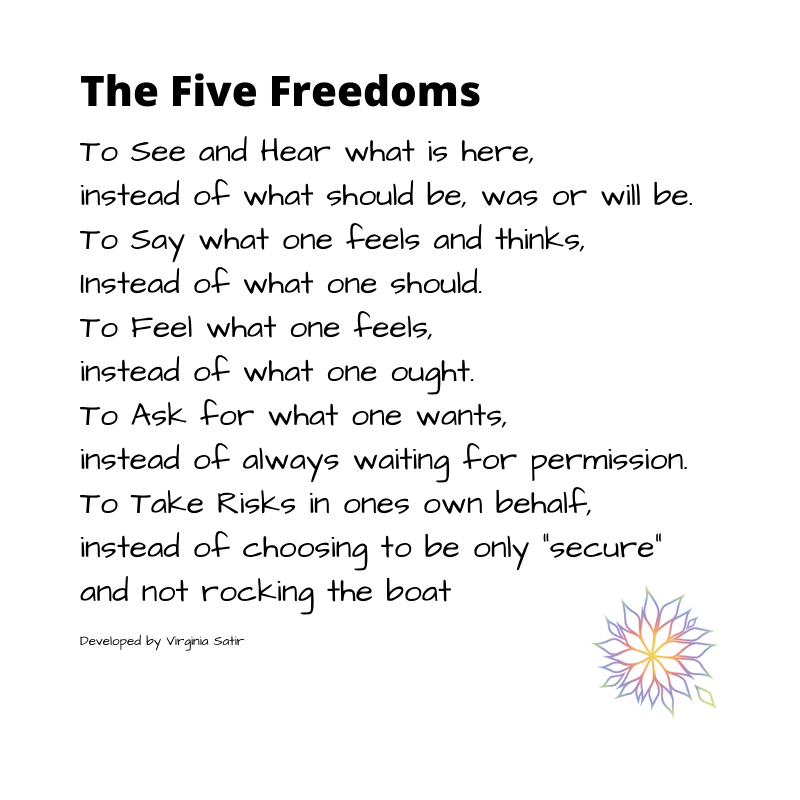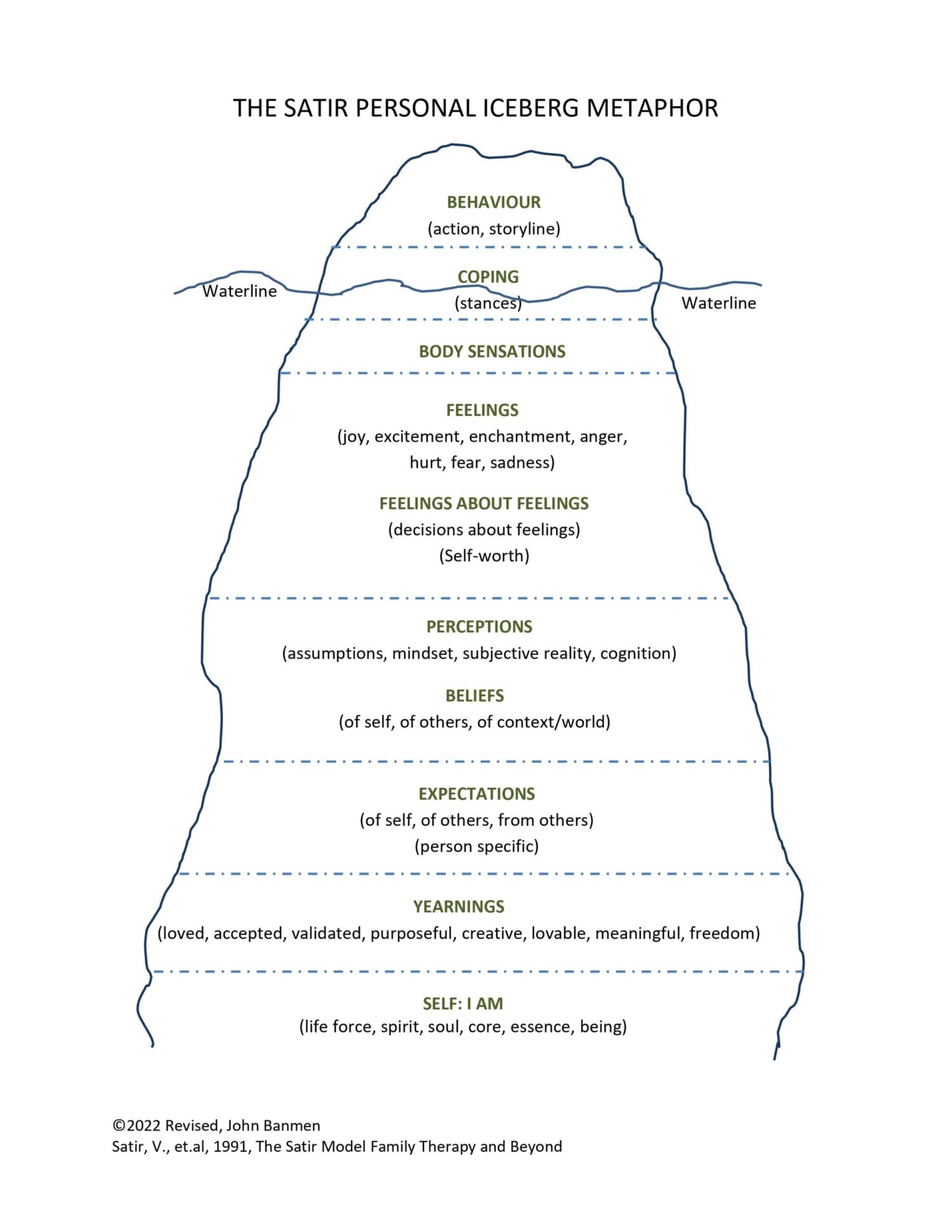
The Theories and Practices of Virginia Satir
Virginia Satir was a highly influential family therapist, known for her groundbreaking work in the field of psychology. Her theories and practices have had a profound impact on the way therapists approach family therapy and interpersonal relationships. Here’s an overview of some key aspects of Satir’s theories and practices:
Human Validation Process Model (HVP):
Satir developed the Human Validation Process Model, which emphasizes the importance of validating individuals’ experiences, emotions, and perspectives within the family system. She believed that genuine validation is essential for healthy communication and relationships.
Communication Theory:
Satir emphasized the significance of clear and authentic communication in fostering healthy relationships. She identified various communication styles, such as placating, blaming, super reasonable, and irrelevant, and stressed the importance of moving towards a congruent communication style characterized by openness, honesty, and empathy.
Family Systems Therapy:
Satir’s approach to family therapy focused on understanding and addressing unhelpful patterns within family systems. She believed that individuals within a family are interconnected, and problems in one member impact the entire family dynamic. Satir worked to help families recognize and change unhealthy patterns of interaction.
Experiential Techniques:
Satir employed a range of experiential techniques in her therapy sessions to facilitate emotional expression, personal growth, and positive change. These techniques included role-playing, sculpting, guided imagery, and family reconstruction exercises.
Self-Esteem Enhancement:
Satir emphasized the importance of self-esteem in personal development and relationship dynamics. She believed that low self-esteem often underlies interpersonal conflicts and psychological issues. Satir worked to help individuals build self-awareness, self-acceptance, and self-worth.
Emotional Healing:
Satir believed in the power of emotional healing. She created a safe and supportive environment where clients could explore and express their emotions freely, leading to greater self-understanding, emotional resolution of old wounds, and freedom to make new choices.
Transformational Change:
Satir viewed therapy as a process of transformational change. When individuals and families can develop greater self-awareness, emotional intelligence, and better relational skills, they are able to connect to self differently so they can live more authentic and fulfilling lives in ways that honour their unique manifestation of life energy.
Overall, Virginia Satir’s theories and practices continue to influence the field of psychology, particularly in the areas of family therapy, communication theory, and personal growth. Her humanistic and experiential approach to therapy remains highly regarded for its emphasis on empathy, authenticity, and relational healing.
How has Satir Therapy Changed Today?
Virginia Satir’s therapy approach continues to have a significant influence on modern psychotherapy, although it has evolved over time. Here are some ways in which Satir’s therapy has evolved:
Integration with other modalities:
Virginia Satir intuitively understood aspects of human experience which are now more formally used in other therapeutic approaches. Her work can be integrated with therapeutic modalities such as mindfulness-based approaches, attachment theory, interpersonal neurobiology, internal family systems work, narrative therapy, expressive art therapies, and body-based therapies. Therapists may draw on Satir’s techniques while also incorporating strategies from these other approaches to tailor treatment to individual client needs.
Cultural Sensitivity:
Satir believed that human processes are universal. All human processes can be accessed and changed regardless of different environments, cultures, and circumstances. The foundation of her work was curiosity, respect, a belief that each person has the internal resources they need to grow, and that even if external change is limited, internal change is always possible. Satir was loved around the world because she touched people deeply: people felt seen and understood in ways that were freeing.
Trauma-Informed Care:
There is a greater understanding today of the importance of trauma-informed care within the mental health field. Therapists can easily integrate trauma-informed approaches with Satir’s approach to address underlying trauma and its impact on individuals and families. Satir was very skilled at creating a safe therapeutic environment, empowering clients, and fostering resilience and healing.
Evidence-Based Practices:
Feedback from clients provides strong evidence of the positive impact they experience from this model. Many currently respected therapies and approaches such as interpersonal neurobiology, polyvagal theory, Integrated Family Systems, attachment theory, and mindfulness-based approaches are consistent with the Satir model. Virginia Satir intuitively understood how people coped and dealt with stress in ways that are now supported by research and a better understanding of our physiological responses to trauma and stress.
Focus on Brief Therapy:
In today’s fast-paced world, there’s often a demand for brief and solution-focused therapy. Therapists may adapt Satir’s techniques to fit within a shorter timeframe, focusing on specific goals and outcomes while still incorporating her principles of empathy, authenticity, and relational healing.
Professional Training and Supervision:
The Satir Institute of the Pacific is a world leader in training and supervision using the Satir Model. The Satir Institute of the Pacific focuses on training counsellors, therapists, social workers, psychologists, and others in helping professions in understanding and integrating the Satir Model into their work with clients. Professionals who take our training are deeply inspired and find it changes their way of seeing and experiencing their work.



